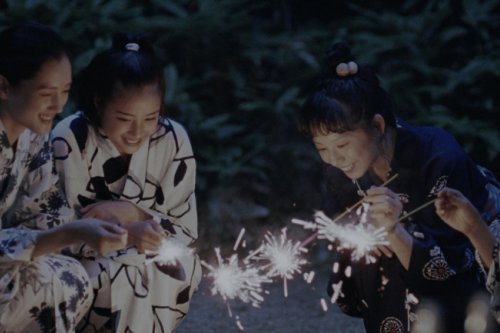Reviews - Our Little Sister
Our Little Sister
Reviewed By John Porter

Our Little Sister
The audience at the Alhambra Cinema on Sunday were treated to Hirokazu Koreeda's drama, Our Little Sister (2015) based on the manga series Umimachi Diary. The tale is deceptively simple. Sachi, Yoshino and Chika are three twenty-something sisters living together in an old inherited house on the outskirts of Kamakura, Japan when they receive word that their estranged father has died. Travelling to the countryside for the funeral they meet their younger half-sister, Suzu, whom Sachi invites to come back with them to live. Suzu's acceptance leads us into a two hour meditation on generational family values, kinship, ritual, and the sisters' forming of their own paths through life.
The characters are distinctive: Sachi is mature and matriarchal, working as a nurse in the local hospital. Yoshino works at a bank and takes every opportunity for a beer. Chika works at a sports shop, and Suzu fits in and amongst them, embracing the life she has fallen upon. Koreeda emphasizes their individual personalities with his cinematography. In scenes where they wrestle with their traumas away from the other siblings, he isolates them in the frame with shallow focus, reducing all background and extraneous characters to a blur. It is a technique which not only separates the sisters from other, non-familial figures, but also directs our attention to their faces as they work through problems. In this way we see them develop as individuals while they are away from their communal home.
The house is a library of time, and through Suzu's discoveries there we too are slowly given access to the hidden links it has formed with the family and their ancestors. She measures her height on the door frame against the other sisters when they were her age and touches each name marked there. Later after leaving the shower she jumps naked like a dance routine in front of a fan to dry herself. The house sees all privacies, and in living there Suzu becomes a part of a chain of people who have also felt the comfort and atmosphere of the building.
For all of their differences, when together the sisters are depicted as a unit. They are bound this way by the traditions, objects, and places that have been passed down their family tree, and recipes from elders are followed not only in their kitchen, but also in cafes across town, far outlasting the cooks and patrons. Food here is always accompanied with story. It is a link through history, and so a way of joining past and present. The girls harvest fruit to make plum wine at a precise moment in the year, storing it with other batches which have been aging through two generations. Eventually as a peace offering Sachi gives their mother jars of liquor made by both the younger sisters and a decade previously by their grandmother. "I'll savour it", the mother says, smiling.
The seasons, encapsulated in the narrative by this wine and the fleeting cherry blossom, are ever present and further foreground the passage of lives. In one scene Suzu rides on the back of a boy's bike through a, 'tunnel', of the flowering trees before being given her grandmother's kimono to wear for a special event. The lightness with which the movie treats such weighty and universal themes is a joy, and contributes to the ease that we are swept along in such a minimalistic plot.
This is a subtle movie not only in subject, but also in style. The camera is close to being in constant and gentle motion, almost floating around the conversations. The topics of these conversations usually lead to ideas of generational repetition: Themes such as caring for elderly relatives, finding oneself in the same situation that led parents to leave the family, and cycles of love and death are all tackled with dignity. They are presented and explored with a beautiful Japanese restraint, leaving just enough unsaid to keep the intangible truths mysterious, and preaching no solutions aside from a warm feeling of some higher balance of life.
The characters are distinctive: Sachi is mature and matriarchal, working as a nurse in the local hospital. Yoshino works at a bank and takes every opportunity for a beer. Chika works at a sports shop, and Suzu fits in and amongst them, embracing the life she has fallen upon. Koreeda emphasizes their individual personalities with his cinematography. In scenes where they wrestle with their traumas away from the other siblings, he isolates them in the frame with shallow focus, reducing all background and extraneous characters to a blur. It is a technique which not only separates the sisters from other, non-familial figures, but also directs our attention to their faces as they work through problems. In this way we see them develop as individuals while they are away from their communal home.
The house is a library of time, and through Suzu's discoveries there we too are slowly given access to the hidden links it has formed with the family and their ancestors. She measures her height on the door frame against the other sisters when they were her age and touches each name marked there. Later after leaving the shower she jumps naked like a dance routine in front of a fan to dry herself. The house sees all privacies, and in living there Suzu becomes a part of a chain of people who have also felt the comfort and atmosphere of the building.
For all of their differences, when together the sisters are depicted as a unit. They are bound this way by the traditions, objects, and places that have been passed down their family tree, and recipes from elders are followed not only in their kitchen, but also in cafes across town, far outlasting the cooks and patrons. Food here is always accompanied with story. It is a link through history, and so a way of joining past and present. The girls harvest fruit to make plum wine at a precise moment in the year, storing it with other batches which have been aging through two generations. Eventually as a peace offering Sachi gives their mother jars of liquor made by both the younger sisters and a decade previously by their grandmother. "I'll savour it", the mother says, smiling.
The seasons, encapsulated in the narrative by this wine and the fleeting cherry blossom, are ever present and further foreground the passage of lives. In one scene Suzu rides on the back of a boy's bike through a, 'tunnel', of the flowering trees before being given her grandmother's kimono to wear for a special event. The lightness with which the movie treats such weighty and universal themes is a joy, and contributes to the ease that we are swept along in such a minimalistic plot.
This is a subtle movie not only in subject, but also in style. The camera is close to being in constant and gentle motion, almost floating around the conversations. The topics of these conversations usually lead to ideas of generational repetition: Themes such as caring for elderly relatives, finding oneself in the same situation that led parents to leave the family, and cycles of love and death are all tackled with dignity. They are presented and explored with a beautiful Japanese restraint, leaving just enough unsaid to keep the intangible truths mysterious, and preaching no solutions aside from a warm feeling of some higher balance of life.
Find A Film
Search over 1500 films in the Keswick Film Club archive.
Friends
KFC is friends with Caldbeck Area Film Society and Brampton Film Club and members share benefits across all organisations
Awards
Keswick Film Club won the Best New Film Society at the British Federation Of Film Societies awards in 2000.
Since then, the club has won Film Society Of The Year and awards for Best Programme four times and Best Website twice.
We have also received numerous Distinctions and Commendations in categories including marketing, programming and website.
 Talking Pictures
The KFC Newsletter
Talking Pictures
The KFC Newsletter
Links Explore the internet with Keswick Film Club


